Nagar Kirtans originate from ‘Parbhaat Pheris’ (Parbhaat literally means ‘early morning,’ and Pheri means ‘going around’). A modern day Parbhaat Pheri would consist of a Gursikh carrying a vaaja (harmonium) tied to themselves, Sangat carrying chhainey (bells), and one person carrying a dholki (drum).

Origin of Nagar Kirtans
One of the earliest Parbhaat Pheris is from Guru Hargobind jee's time when Guru Sahib was in the Gwalior Fort with the 52 imprisoned princes. Baba Buddha jee led a Parbhaat Pheri around the Gwalior Fort as a form of protest and raising the spirits of the Sikhs.

Sikh Tradition
Early in the morning the group of Gursikhs would walk around the village or city singing shabads and people would join them as they walked past their homes. Leading the jatha (group) would be a Gursikh holding a Nishaan Sahib and Gursikhs leading the Shabad recitation. The processions gave opportunity for people to enjoy the bliss of singing the Lord’s Praises, an opportunity to distribute relevant and useful Gurmat literature to the public and also share a positive image of the Guru's Khalsa. In recent history we have started doing processions which include Guru Maharaaj's Sawaari (without Prakaash) and also Panj Pyaare leading the procession.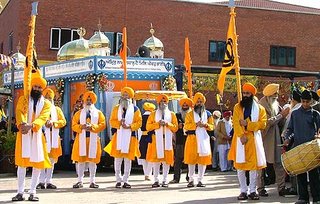
Benefit of Traditional Nagar Kirtan
The traditional Nagar Keertans or Parbhaat Pheris inspired people to sing Gurbani and gave them opportunity to distribute educational material in regards to Gurmat. Seeing Chardikala Gursikhs in public doing keertan provided the public and youngsters with positive role models and good impressions of what and who Sikhs are. The whole event would have a community spirit, gathering the community together and inspiring others to sing and understand Gurbaani.
Today’s Nagar Keertans
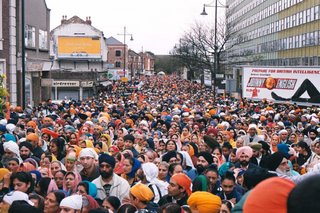
Sadly the Gurmat spirit of Nagar Keertans is being slowly lost, which makes question the benefit of holding such events. Some of the unfortunate traits creeping into modern Nagar Keertans:
* EAT AS MUCH AS YOU CAN squeeze into your stomach. It's let loose and gluttony time.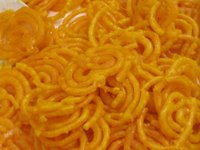
* Wearing as many BIG KHANDEY possible and WAVING A NISHAAN SAHIB like people wave a football team flag in a football game.

* PUSHING one another and SQUASHING OTHERS (young, old and children) attempting to do Matha Tekh. Get crushed and then get your legs bruised by an Aunty pushing her baby push-chair into your legs!

* If you are bored of the Kirtan, there's an OPTION OF DOING BHANGRA and jumping and down, with a few Jaikaaray being shouted out in between the dancing.
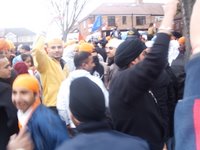
RAB BHALLA KARE (God help us)! Don't know what else to comment!
Some positive points:
* Some children sit on floats and sing Shabads
* You can see some parents with their children who have especially DRESSED UP IN BANA (traditional Sikh attire) and sing along with the Kirtan.
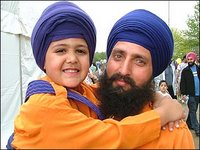
...However, these people are sadly a MINORITY!
How productive are today’s Nagar Kirtans in educating, promoting and highlighting Gurmat
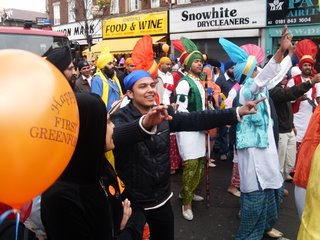
Generally the whole atmosphere of Nagar Keertans nowadays is of a street carnival, with an unfortunate motto of "khaa-o pee-o aish karo" (ਖਾਓ ਪੀਓ ਐਸ਼ ਕਰੋ) being practiced. People are more interested in Bhangra than keertan - not much of a "Nagar KEERTAN." Read more about this on Panthic Weekly news article.
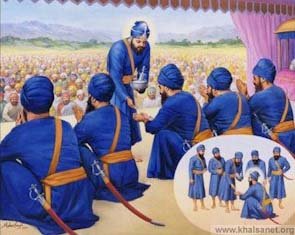
Thought to take away
We are celebrating the birth day of the Khalsa Panth. We should ask ourselves what do we learn from the Vaisakhi of 1699 and the establishment of the Khalsa Panth? How do we improve ourselves, and what steps do we take to change and adjust our lives to become closer to Guru jee and receiving the true 'kushee' (happiness) of Guru Gobind Singh jee.

Origin of Nagar Kirtans
One of the earliest Parbhaat Pheris is from Guru Hargobind jee's time when Guru Sahib was in the Gwalior Fort with the 52 imprisoned princes. Baba Buddha jee led a Parbhaat Pheri around the Gwalior Fort as a form of protest and raising the spirits of the Sikhs.

Sikh Tradition
Early in the morning the group of Gursikhs would walk around the village or city singing shabads and people would join them as they walked past their homes. Leading the jatha (group) would be a Gursikh holding a Nishaan Sahib and Gursikhs leading the Shabad recitation. The processions gave opportunity for people to enjoy the bliss of singing the Lord’s Praises, an opportunity to distribute relevant and useful Gurmat literature to the public and also share a positive image of the Guru's Khalsa. In recent history we have started doing processions which include Guru Maharaaj's Sawaari (without Prakaash) and also Panj Pyaare leading the procession.
ਆਵਹੁ ਸਿਖ ਸਤਿਗੁਰੂ ਕੇ ਪਿਆਰਿਹੋ ਗਾਵਹੁ ਸਚੀ ਬਾਣੀ ॥
aavahu sikh satguroo ke piaarihu gaavhu sachee baaNee.
Come, O beloved Sikhs of the True Guru, and sing the True Word of His Baani.
(Ang 920, SGGS)

Benefit of Traditional Nagar Kirtan
The traditional Nagar Keertans or Parbhaat Pheris inspired people to sing Gurbani and gave them opportunity to distribute educational material in regards to Gurmat. Seeing Chardikala Gursikhs in public doing keertan provided the public and youngsters with positive role models and good impressions of what and who Sikhs are. The whole event would have a community spirit, gathering the community together and inspiring others to sing and understand Gurbaani.
ਜਨੁ ਨਾਨਕੁ ਧੂੜਿ ਮੰਗੈ ਤਿਸੁ ਗੁਰਸਿਖ ਕੀ ਜੋ ਆਪਿ ਜਪੈ ਅਵਰਹ ਨਾਮੁ ਜਪਾਵੈ ॥੨॥
jan naanak DhooR mangai tis gursikh kee jo aap japai avrai naam japaavai.2.
Servant Nanak begs for the dust of the feet of that GurSikh, who himself chants the Naam, and inspires others to chant it.
(Ang 306, SGGS)
Today’s Nagar Keertans

Sadly the Gurmat spirit of Nagar Keertans is being slowly lost, which makes question the benefit of holding such events. Some of the unfortunate traits creeping into modern Nagar Keertans:
* EAT AS MUCH AS YOU CAN squeeze into your stomach. It's let loose and gluttony time.

* Wearing as many BIG KHANDEY possible and WAVING A NISHAAN SAHIB like people wave a football team flag in a football game.

* PUSHING one another and SQUASHING OTHERS (young, old and children) attempting to do Matha Tekh. Get crushed and then get your legs bruised by an Aunty pushing her baby push-chair into your legs!

* If you are bored of the Kirtan, there's an OPTION OF DOING BHANGRA and jumping and down, with a few Jaikaaray being shouted out in between the dancing.

RAB BHALLA KARE (God help us)! Don't know what else to comment!
Some positive points:
* Some children sit on floats and sing Shabads
* You can see some parents with their children who have especially DRESSED UP IN BANA (traditional Sikh attire) and sing along with the Kirtan.

...However, these people are sadly a MINORITY!
How productive are today’s Nagar Kirtans in educating, promoting and highlighting Gurmat

Generally the whole atmosphere of Nagar Keertans nowadays is of a street carnival, with an unfortunate motto of "khaa-o pee-o aish karo" (ਖਾਓ ਪੀਓ ਐਸ਼ ਕਰੋ) being practiced. People are more interested in Bhangra than keertan - not much of a "Nagar KEERTAN." Read more about this on Panthic Weekly news article.

Thought to take away
We are celebrating the birth day of the Khalsa Panth. We should ask ourselves what do we learn from the Vaisakhi of 1699 and the establishment of the Khalsa Panth? How do we improve ourselves, and what steps do we take to change and adjust our lives to become closer to Guru jee and receiving the true 'kushee' (happiness) of Guru Gobind Singh jee.

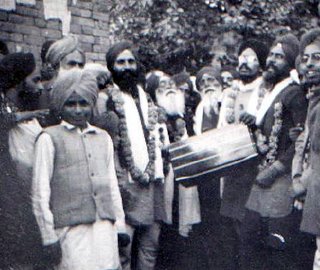
Comments
In the picture, the Bhai Sahib in the middle with a Khanda on his dastaar is respected great Gursikh - Bhai Sahib Randheer Singh ji. The Bhai Sahib on the Vaaja is the late Giani Amolak Singh Ji. The Bhai Sahib on the left of Giani Ji is Bhai Mal Singh Ji (aka Baoo Mal Singh Ji).